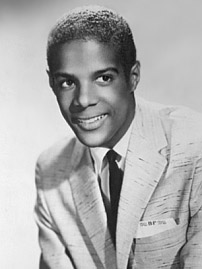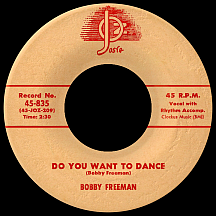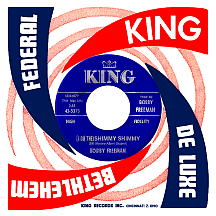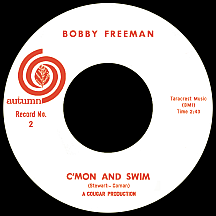BOBBY FREEMAN
Compared to other major U.S. cities, San Francisco was slow to develop music artists (hitmaking ones, at least) at the outset of rock and roll's road to dominance in the early- to mid-1950s. The 4 Deuces stand out as one notable act from the Bay Area (despite their 1955 hit, "W-P-L-J," being unintentionally associated with New York radio station WPLJ). Another was Etta James, a Los Angeles native who had lived in San Francisco for several years prior to her breakthrough '55 single "The Wallflower." About a decade later, the city made up for lost time with the late-'60s psychedelic rock movement (spearheaded by The Grateful Dead, Jefferson Airplane, Moby Grape, Santana and a great many others). In between these two periods Bobby Freeman, a gyrating young man from San Fran, appeared as the nation's teenagers were tuning in daily to ABC-TV's American Bandstand; with the show's help, "Do You Want to Dance" became his first of several hits in the spring of 1958.
Freeman took a swing at more than a few vocations during his adolescence: paper boy, porter, file clerk, delivery boy, amateur songwriter. At the age of 14 he was in a vocal group called The Romancers with Tyrone French, James Selbourne, Texas-born transplant Woodrow "Bobo" Blake and lead singer Alvin Thomas (whose brother, James Thomas, was briefly a member before joining the Navy). They performed at school dances and various events around town, then traveled to Los Angeles in mid-1955 to record four sides for Dootsie Williams' Dootone Records. Tyrone sang lead on a slow romantic number, "I Still Remember," the A side of their first single, issued in early 1956. "This is Goodbye," another ballad, came several months later; the B sides, "House Cat" and "Jump and Hop," were uptempo rockers with tenor sax breaks by Dootone's Chuck Higgins. Two other songs, "You Don't Understand" and "Baby, I Love You So," were recorded later in San Francisco but weren't released until later. The Romancers called it quits after more than two years together. Bobby started a short-lived group, The Vocaleers (finding out afterwards there was a New York-based Vocaleers that had scored a hit in 1953 with "Is it a Dream").
He made a demo recording of his own compositions, "Do You Want to Dance" and "Big Fat Woman" (Larry Williams-inspired?), on which he sang and played piano and a friend backed him on congas. Jubilee Records' newlywed A&R man Morty Palitz (who happened to be on his honeymoon in San Francisco when he discovered the young singer) signed him to the company's Josie label; Bobby was still attending San Francisco's Mission High School and living with his mother and grandmother! Instead of re-recording the songs, Palitz had studio musicians overdub guitar, bass and drums on the crudely-made demo. "Dance" was released in March and took off immediately on Bay Area radio while gaining a more gradual acceptance nationwide. After numerous plays on Bandstand and an appearance by Bobby on a late April episode of The Dick Clark Beech-Nut Show, the song made its way to the top ten of the pop charts in June '58 and went as high as number two on the R&B charts (held off by the year's longest-running chart-topper, "Yakety Yak" by The Coasters).
In August he performed on Alan Freed's Big Beat Rock n' Roll Show at New York's Brooklyn Fox Theatre. Brad Taylor, the Romancers' former manager, released the group's two remaining sides that fall on his S.F.-based Bay-Tone label. Freeman assembled a backing band that included guitarist Eddie Quinteros (who had a minor hit single in 1960, "Come Dance With Me"); Bobby's new manager, Bill Massey, also represented Eddie. "Betty Lou Got a New Pair of Shoes" ('...wah-ooo, wah-ooo, wah-ooo...'), a follow-up dancer with a slightly more frantic pace, started climbing the charts (while the debut disc was still hot) and reached the top 40 before the end of August.
His third straight self-penned double-sider, the high-energy "Shame on You Miss Johnson" ('...I caught you runnin' around...oh, yeah...with another clown!') backed with "Need Your Love," wound up with the soft, romantic side getting the majority of airplay and landing mid-chart in December. For a change of pace, he did an uptempo, guitar-backed take on Mark Fisher, Joe Goodwin and Larry Shay's late-1920s standard "When You're Smiling," but it failed to catch on. His versions of "Mary Ann Thomas" (by Don Wolf and Ben Raleigh, who penned a couple of Barbara McNair's early singles) and "Ebb Tide," a six-year-old ballad by Robert Maxwell and Carl Sigman (the first and biggest of many hit versions was an instrumental by orchestra leader Frank Chacksfield), kept Bobby on the charts in the latter half of 1959.

He went to King Records and landed another top 40 hit in September 1960; "(I Do The) Shimmy Shimmy," written by his manager, Bill Massey, with Albert Gibson, a staff writer and arranger for King also known as Albert Shubert, may have been Bobby's most tirelessly energetic dance song yet ('I do the shimmy when I walk down the street....'cause psycho music gives me the creeps...' wasn't the only song reference to that summer's nerve-wracking box office blockbuster by director Alfred Hitchcock)! Several more tracks were recorded for the label, though oddly there were no singles released right away; a rift between Josie and King over the rights to Freeman's contract has been cited as the possible reason. Four more Josie 45s appeared over the next year and a half; another dance tune, "The Mess Around," appeared near the bottom of the pop charts in April 1961 (Chubby Checker was peddling the dance with a different "Mess Around" song around the same time). Bobby went over the line of reason with "She Said She Wants to Dance," with a near-identical arrangement to "Do You Want to Dance." It rightly stiffed. He needed to get back on track with something fresh.
San Francisco disc jockey Tom Donahue (one of KYA's top personalities at the time) joined fellow deejay Bob Mitchell (real name: Michael Guerra, Jr.) and started Autumn Records in the summer of 1963. The first release was "Let's Surf Again," an unnecessary cover by Freeman of a head-scratching remake Checker had done of his hit "Let's Twist Again." It was a dubious beginning for what would soon become one of the more intriguing independent record labels of the 1960s. Donahue hired another deejay, Sylvester Stewart (the future-famous Sly Stone), as a staff producer. The second Autumn disc, also by Bobby, came almost a year later; "C'mon and Swim," written by Sly and Donahue (using his birth name, Thomas Coman), caught on when Bobby demonstrated the arm-paddling movements on several TV dance shows. The song took off much like "Do You Want to Dance" had six years earlier, spending most of August and September '64 in the top ten, reviving Freeman's career in the process. He toured with Dick Clark's Caravan of Stars at the same time the single was peaking.
A follow-up, "S-W-I-M" (also penned by Sly and Tom), would seem a risky choice, but the record landed mid-chart during the fall (and was reprised by Sly with his own similar effort, "I Just Learned How to Swim," credited to Sylvester Stewart, the third Autumn single). King Records owner Syd Nathan, who'd been sitting on more than a dozen of Bobby's 1960 masters for a few years, released three singles in '64 and '65. There were follow-ups on Autumn including "I'll Never Fall in Love Again," a Sly song that suggested a newer, more soulful turn for Freeman. Autumn had a strong presence in 1965, leading the Bay Area charge with four hits by The Beau Brummels and notable rock singles by The Mojo Men, The Vejtables and others, but by early '66 the pressures of running an indy label resulted in its closure. In the summer of 1967, Donahue made a historic move when he reprogrammed KMPX-FM 107 (actually 106.9) as the first free-form, "underground" rock station, beginning a major movement that impacted every radio market as the '60s and '70s progressed.
Making his own progression in the late '60s and early '70s, Bobby recorded briefly for Loma (a Warner Bros. soul music subsidiary), Double Shot (an L.A. label where his final chart single, "Everybody's Got a Hangup," came about in 1969) and Avco, where he did a takeoff on Isaac Hayes' most famous song; "I'm Shaft (You Ain't Shaft)" was one of two releases credited to R.B. Freeman. Resuming with his own name for the Touch label, "Everything's Love" became his vinyl swan song. He continued performing live for years to come. "Do You Want to Dance" has been his most durable song, recorded by an abundance of artists (often under the title "Do You Wanna Dance"). Cliff Richard, Del Shannon, The Beach Boys, The Mamas and the Papas, Bette Midler, John Lennon and The Ramones rank among the Bobby Freeman fans who have had success with their versions of his first and greatest hit.
NOTABLE SINGLES:
- Do You Want to Dance - 1958
- Betty Lou Got a New Pair of Shoes - 1958
- Need Your Love /
Shame on You Miss Johnson - 1958 - When You're Smiling - 1959
- Mary Ann Thomas - 1959
- Where Did My Baby Go? - 1959
- Ebb Tide - 1959
- (I Do The) Shimmy Shimmy - 1960
- The Mess Around - 1961
- She Said She Wants to Dance - 1961
- Let's Surf Again - 1963
- C'mon and Swim - 1964
- S-W-I-M /
That Little Old Heartbreaker Me - 1964 - I'll Never Fall in Love Again - 1965
- The Duck - 1965
- Soulful Sound of Music - 1966
- Everybody's Got a Hang Up - 1969
- Four Piece Funky Nitty Gritty Junky Band - 1969
- Chain Gang - 1972
as R.B. Freeman - I'm Shaft (You Ain't Shaft) - 1972
as R.B. Freeman - Everything's Love - 1973




